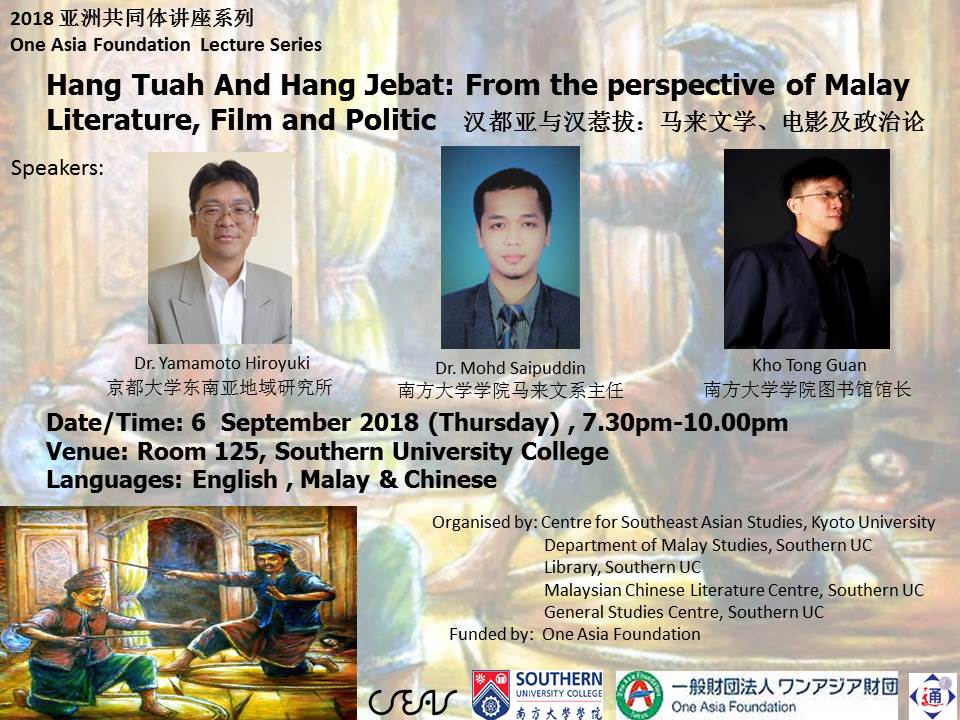2018 One Asia Foundation Lecture Series
Hang Tuah And Hang Jebat: From the perspective of Malay Literature, Film and Politic
Speakers:
Dr. Yamamoto Hiroyuki(山本博之副教授,京都大学东南亚地域研究所)
Dr. Mohd Saipuddin(南方大学学院马来文系主任)
Kho Tong Guan(许通元,南方大学学院图书馆馆长)
Date/Time: 6 Sept 2018, 7.30-10.00pm
Venue: Room 125
Languages: Malay, English & Chinese.
Organised by:Centre for Southeast Asian Studies, Kyoto University
Dept. Malay Studies, Southern University College
Malaysian Chinese Literature Centre, Library, Southern University College
General Studies Centre, Southern University College
Funded by: One Asia Foundation
Speaker and content Intro:
YAMAMOTO Hiroyuki Intro
Associate professor, Center for Southeast Asian Studies (CSEAS), Kyoto University, Japan,
Secretary-General, the Japan Association for Malaysian Studies (JAMS),
Steering Committee Chairperson, The Japan Consortium for Area Studies (JCAS).
He visited Malaysia in 1984 as an exchange student at Kluang High School, Johor and stayed in a local family for a year when he was a high school student. The experience fascinated him to know more about multiculturalism of the Malaysian society, which drove him to learn Mandarin at Beijing Foreign Studies University. After obtained his M.A. in Area Studies of Asia from the University of Tokyo, he stayed in Sabah for 6 years where he worked as lecturer at Universiti Malaysia Sabah while preparing for his doctoral dissertation on modern history of Sabah. He obtained his Ph. D. from the University of Tokyo in Area Studies of Asia.
His fields of specialization are; (1) modern history: development of multiculturalism in Southeast Asia, (2) media studies: vernacular and audio-visual media and collective identity in multicultural society, and (3) disaster management studies: record and memory of disaster in oral tradition and literature in Southeast Asia. Currently he organizes research projects such as “Discovering Malaysian History and Culture with Jawi”, “Research on film and society of Malaysia”, and “Regional Platform for Disaster Risk Reduction in Asia”.
He has published co-edited volumes including Bangsa and Umma: Development of People-Grouping Concepts in Islamized Southeast Asia (Kyoto University Press, 2011), and Film in Contemporary Southeast Asia: Cultural Interpretation and Social Intervention (Routledge, 2012).
His current research interest is on national identity in the representation of heroes in films and literature in the Malay world.
Title: Hang Tuah and Jebat: Double exposure image of national hero in Malaysian film
Content: Hang Tuah, narrated as a hero of the Melaka Sultanate era, is widely regarded as a national hero of Malaysia today. Most of the image of Hang Tuah, a hero who was royal to the monarch, was formed in the first half of the 20th century through theater and later penetrated the people through textbooks and other official media. On the other hand, novels, theater, films and criticisms after independence considered Hang Jebat, who rebelled against a brutal and unjust monarch, as a hero. As a result, Malay(sian) society had Hang Tuah-like spirit and Hang Jebat-like spirit towards monarchs and leaders. This 2-in-1 spirit or double exposure image of the national hero is unique to Malaysia, which has had a great impact on the institutions of Malay(sian) society. However, after controversies over the origin of Hang Tuah which continues since mid-2000s, Malay(sian) society is facing a crisis on the image of national hero.
Kho Tong Guan Intro
Chief Librarian of Southern University College, Head of Malaysian Chinese Literature Collection Centre, Southern University College. Editor-in-Chief and Editor of Chao Foon Literary Journal, President of The Writers’ Association of Chinese Medium of Malaysia (Johore State). Author of Tales of Two Towns《双镇记》(Collection of Short Stories, 2005) , Burial of Haemadipsa《埋葬山蛭》(Collection of Short Stories, 2011) , Waiting for Nautilus 《等待鹦鹉螺》(Collection of Proses, 2011), In a Vial the Lactobacilli Kept and Gone 《养死一瓶乳酸菌》(Collection of Poems, 2014), My Professor is a Terrorist (Collection of short stories, 2018). Editor of Shang Wan-Yun’s The Flea: A Collection of Fictions, Collection of Malaysian Chinese Gay Fictions, Singapore Chinese Literature 50 years & etc.
Content:
Who needs a Malay National Hero? — The Cultural Symbolism meaning in the Construction of Hang Tuah and Hang Jebat’s Creative and Realistic Image.
The two legendary Malay national heroes of Hang Tuah and Hang Jebat have been lurking in the Malay people, and even in the minds of the Malaysian, they have been used from time to time, especially from the famous sentence of Hang Tuah: “Never should the Malays feel lost in the world” which from Hikayat Hang Tuah is to maintain the national significance of dignity, loyalty, wisdom, courage, good fighting skill, and contribution to the ruler. However, the theme of of loyalty and justice that Hang Tuah and Hang Jebat have highlighted in the various materials, from the Sejarah Melayu, Hikayat Hang Tuah, film adaptation of Hang Tuah, Hang Jebat, Tuah, the materials which in the collection of Southern University College Library and the Malaysian Chinese Literature Centre. From the perspective of literature, film and politics, how can we discover the cultural symbolism meaning of the image of Hang Tuah and Hang Jebat? Is there any changes, values and meanings that can give to our readers.
Dr. Mohd Saipuddin Suliman Intro
Acting Head of Dept. Malay Studies, Southern University College, Southern University College. Research Interests include: Creative Writing, Film Criticism, Malay Language, Culture & Literature Studies. Career Experience include Stringer/Contributor for The New Straits Time Press (NSTP) Malaysia Berhad, Script Writer for Rancangan Radio Televisyen (RTM), Script Writer for Line Clear Film Production.
Discussion Topics:
• Origins of Hang Tuah & Hang Jebat
• Hang Tuah is Chinese?
• Malay Classic Film (Hang Jebat, 1961)
• Wrong to admire Hang Tuah, says Tun Mahathir (2012)

